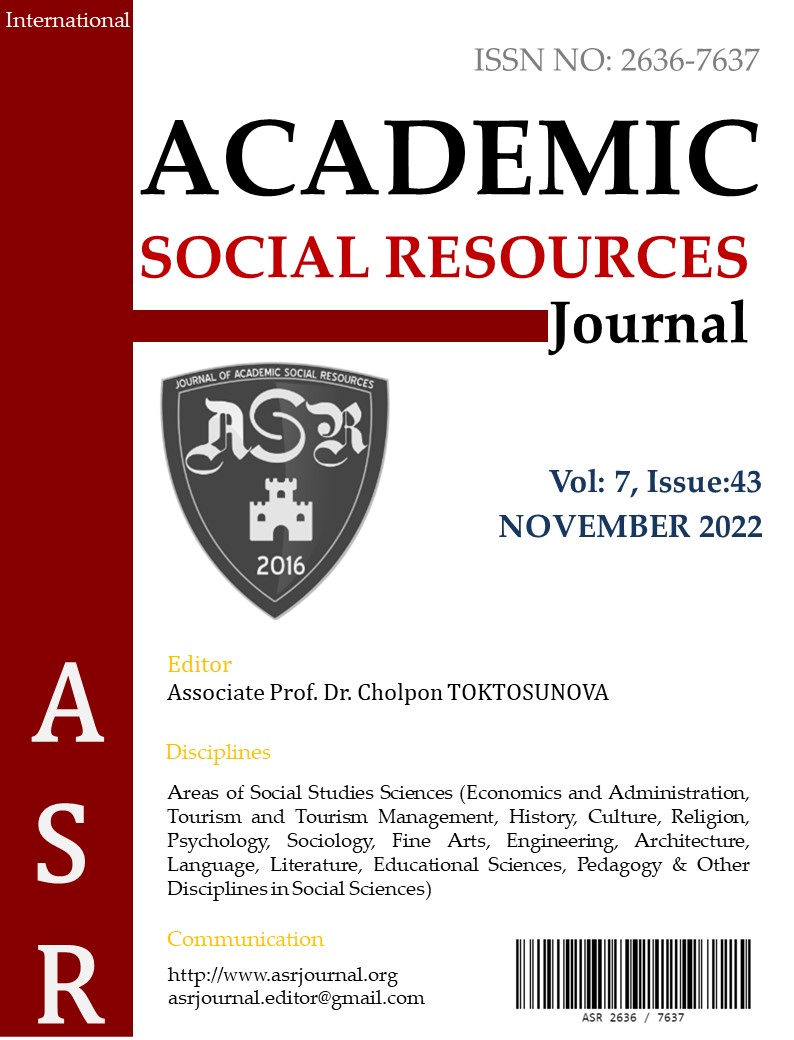Author :
Abstract
Yazdığı eserlerle köy edebiyatı akımını başlatan şair, yazar ve öğretmen Mahmut Makal 1930 yılında Aksaray ilinin Gülağaç ilçesi Demirci Kasabasında doğdu. 1943 yılında İvriz Köy Enstitüsü'ne başladı. 1947'de enstitüden mezun olunca kendi köyüne yakın Aksaray’a bağlı Nurgöz köyünde altı yıl öğretmenlik yaptı. Edebiyata şiirle başlasa da adını köy hayatını ve eğitim enstitülerinin önemini anlatan eserlerle duyurmuştur. “Bozkırdaki Kıvılcım Enstitülüler” adlı eserde vurguladığı eğitim problemleri onlarca yıl geçse de ülkemizdeki eğitim problemlerinin aynı şekilde devam ettiğini göstermektedir. Bu çalışma söz konusu eser bağlamında “dışa dönük edebiyat eleştirisi yöntemiyle” eğitim problemleri açısından incelemeyi amaçlamaktadır.
Bir eğitim kurumu için insan unsuru ne kadar önemli ise fiziki imkânlar da aynı derecede önem arzetmektedir. Milli eğitim sistemimiz incelendiğinde görülecektir ki hemen her dönem fiziki yetersizlik en önemli sorunlardan biri olarak görülür. Hele de söz konusu yer köyler olunca okul binasından tefrişatına, yolundan avlusuna kadar bu eksikler hep var olagelmiştir. Mahmut Makal, milli eğitim sistemine bir köy öğretmeni olarak dahil olmasından kaynaklı olsa gerek, eserlerinde köy okullarının fiziki şartlarıyla ilgili, ders müfretdatı ve köy enstitüsü mezunu öğretmenlerin çok yönlü olarak yetişmiş olduğu üzerinde durmuştur. Onun üzerinde durduğu bir diğer konu da köy enstitülü öğrencilerin sırf bu okullarda okudukları için ayrıma tabi tutulmuş olmalarıdır. Sırf bu yüzden elde ettikleri bazı haklar onlara verilmemiştir.
Keywords
Abstract
Poet, writer and teacher Mahmut Makal, who started the village literature movement with his works, was born in 1930 in the town of Demirci, Gülağaç district of Aksaray province. in 1943, he started Ivriz Village Institute. After graduating from the institute in 1947, he worked as a teacher for six years in the village of Nurgoz, Aksaray, close to his native village. Although he started his career in literature with poetry, he made his name with works describing village life and the importance of educational institutes. The educational problems highlighted in the work “Sparks in the Steppe Institute" show that although decades have passed, the educational problems in our country continue in the same way. This study aims to examine the educational problems in terms of “outward-looking literary criticism method” in the context of the work in question.
As important as the human element is for an educational institution, physical facilities are equally important. When our national education system is examined, it will be seen that physical inadequacy is seen as one of the most important problems in almost every period. Especially when it comes to villages, these deficiencies have always existed from the school building to the furnishing, from the road to the courtyard. Mahmut Makal, probably due to his involvement in the national education system as a village teacher, has focused on the physical conditions of village schools in his works, the course staff and teachers graduated from the village institute have been trained in a multifaceted way. Another issue he focuses on is that students from village institutes were subjected to discrimination just because they studied at these schools. That is why some of the rights they have obtained have not been given to them.
Keywords
- 1. Demircan, C. – İnandı, Y. (2008). Köy Enstitüleri Programlarında Anadilinin Önemi ve Türkçe Öğretimi Mersin Üniversitesi Eğitim Fakültesi Dergisi (Özel Sayı: Köy Enstitüleri), 4 (1): 1-13.
- 3. http://www.tongucvakfi.org.tr/304smail-hakk305-tonguccedilun-hayat-hikayesi.html, (Erişim: 31.09.2022)
- 4. http://www.tongucvakfi.org.tr/koumly-enstituumlleri.html, (Erişim tarihi: 25.09.2022)
- 5. https://sozluk.gov.tr/ Erişim tarihi: 10.09.2022
- 6. https://www.academia.edu/6806377/Hasano%C4%9Flan_K%C3%B6y_Enstit%C3%BCs%C3%BC_ve_Y%C3 %BCksek_K%C3%B6y_Enstit%C3%BCs%C3%BC_Yerle%C5%9Fkesi_nin_Tarih%C3%A7esi_ve_De%C4% 9Ferleri (Erişim 09.09.2022)
- 7. https://www.meb.gov.tr/koy-yasam-merkezleri-ile-koy-okullari-aktif-egitim-birimleri-olarak- kullanilacak/haber/26105/tr) 08.09.2022.
- 8. Işık, H. (2004). Öğrenme Ortamlarının Fiziksel Düzeni, Sınıf Yönetimi, (Ed. Mehmet Şişman ve Selahattin Turan), Pegem A Yayıncılık, Ankara.
- 9. Işık, H. (2004). Öğrenme Ortamlarının Fiziksel Düzeni, Sınıf Yönetimi, (Ed. Mehmet Şişman ve Selahattin
- 10. Kubat, E. (2019). Köy Enstitülerinden Mezun Öğrencilerin Enstitülerin Eğitim Programıyla İlgili Görüşleri: Bursa Örneği, Yüksek Lisans, Uludağ Üniversitesi/Eğitim Bilimleri Enstitüsü, Bursa.
- 11. Makal, M. (2008). Bokırdaki Kıvılcım Enstitülüler, 5. Basım, Literatür Yayınları, İstanbul,
- 12. Okçabol, R. (2006). Köy Enstitüleri ile İlgili Eleştirilere Değinmeler, Yeniden İmece Dergisi, Şubat. İzmir: 17- 26.





